Welcome to the BNE Blog – Your Trusted Source for Concrete Flooring Insights!
At BNE Concrete Floors & Coatings, we're more than just experts in concrete flooring solutions; we're enthusiasts who are passionate about sharing our knowledge and experience.
Our blog features the latest industry news, concrete solutions for various industries, and essential tips for maintaining your concrete floors.
Whether you're exploring flooring options for industrial use, seeking stylish and sustainable polished concrete solutions, or looking for maintenance advice, our blog is your guide! Join us in exploring the sophisticated and practical world of concrete flooring.
Each tag category in our blog is designed to guide, inform, and inspire you about the endless possibilities of concrete flooring.
You can navigate our blog with the blog tags below:
Concrete Industry News: Stay updated with the latest trends and developments. We provide insights into new technologies, market trends, sustainability initiatives, and regulatory changes impacting the concrete industry.
Industry Specific: We dive into how concrete solutions uniquely benefit various sectors like grocery stores, automotive facilities, and healthcare institutions. Learn about tailored flooring needs, durability demands, and aesthetic considerations for each industry, and how concrete flooring meets these specific requirements with efficiency and style.
Concrete Maintenance/Repair Tips: Gain insights on how to effectively preserve and care for your concrete surfaces. Learn about cleaning techniques, repair strategies, and preventative measures to extend the lifespan and appearance of your concrete flooring, ensuring it remains durable and visually appealing for years to come.
Epoxy Floor Coatings: Learn how these durable, chemical-resistant coatings are ideal for various applications, from industrial and commercial spaces to stylish residential areas, offering easy maintenance and a range of aesthetic options.
Polished Concrete Floors: Discover how this sleek, modern flooring option not only enhances the aesthetic of any space but also offers durability, low maintenance, and eco-friendliness. Ideal for various settings from homes to high-traffic commercial areas, polished concrete floors are a versatile choice that melds style with functionality.
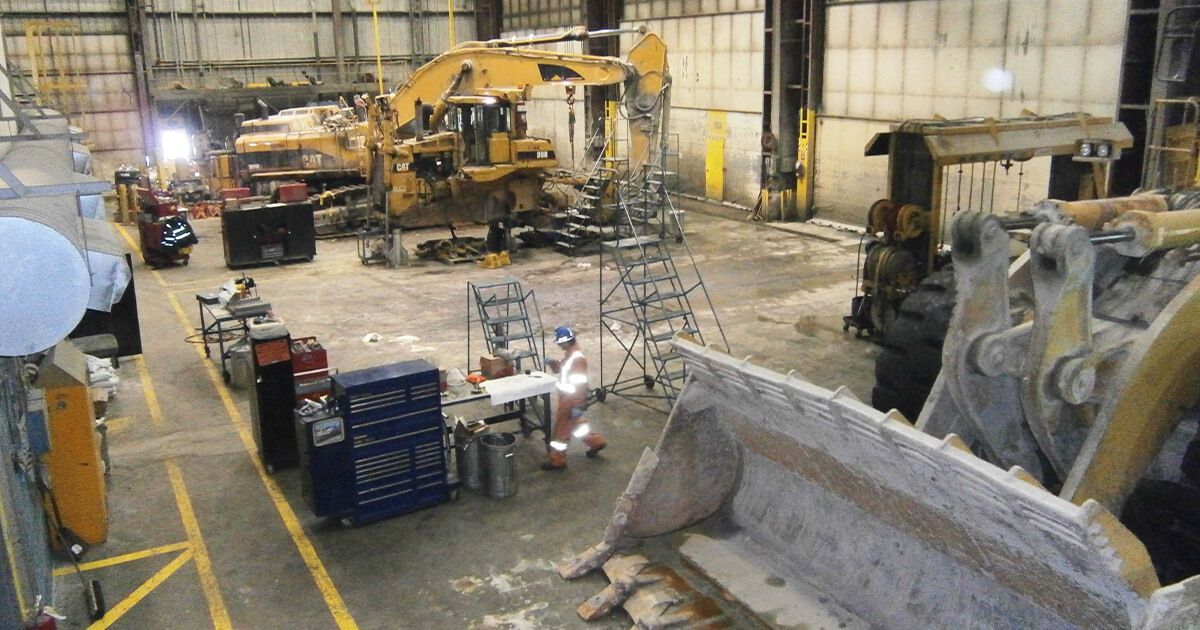
After 30 years, I think itsit's fair to say that after 30 years there isn’ not a lot much BNE Concrete Floors & Coatings hasn’t seeseen. From routine jobs to more complex projects, no one can match our expertise.
This post is the first of a three partfirst in a three-part series where we’ll lo are going to look at three types of epoxy floor systems and explain when we will recommend each to meet and exceed our clients’ needs:.
Epoxy Ree-Ssurfacing
Specialized Epoxy Coating Systems
ESD
Mechanical Room Waterproofing (MRW)
Chemical Resistant Coatings
Decorative & Thin Epoxy Systems
Today, we’ll go into the benefits of using epoxy to restore a high-traffic concrete floor and show you how we got the job done with minimal downtime.
Using an epoxyepoxy to resurface a concrete floor is nothing new. But what most people don’t know is how durable a thick epoxy coating can be, and how useful it is for ana business that cannot shut down for even a day.
BNE was contracted to provide a solution for a badly pitted concrete floor in a 12,000-square-foot maintenance building in Timmins, ON. Nothing unusual about the project, except for one major detail:. “NO DOWN TIME!”.
Our client is one of the largest gold mining companies in Canada. This maintenance building needs to operationalbe operational every day, no exceptions. Without the ability to repair large equipment, the gold stays in the ground, which means profits stay in the ground.
BNE worked out a plan to resurface the maintenance floor with a highly abrasion- resistant, trowel- applied epoxy in two phases:
Each phaseIn phase one, we worked on being 6,000 sqauare feet of the floor completedover in 5-6 days, leaving half the floor operational for the client.
In phase two, we traded places: the client’s operations moved to the half of the floor that was now resurfaced while we worked on resurfacing the second half.
After 12 days, the entire floor was resurfaced with no downtime to the client.
Before getting into the resurfacing process, we have to set the stage for success. Preparation is arguably the most important step in the entire process, since it directly affects adhesion, durability, and overall quality.
For this project, we prepared the floor using a method called scarification, targeting a Concrete Surface Profile (CSP) of 5-6. Scarification is the process of removing the top layer of concrete (including existing coatings, contaminants, or inconsistencies) to create a rough surface texture, allowing the epoxy coating to adhere better.
Achieving a CSP of 5-6 meant we created a surface rough enough for the epoxy to anchor securely, but not so rough as to hinder the application and finish of the coating.
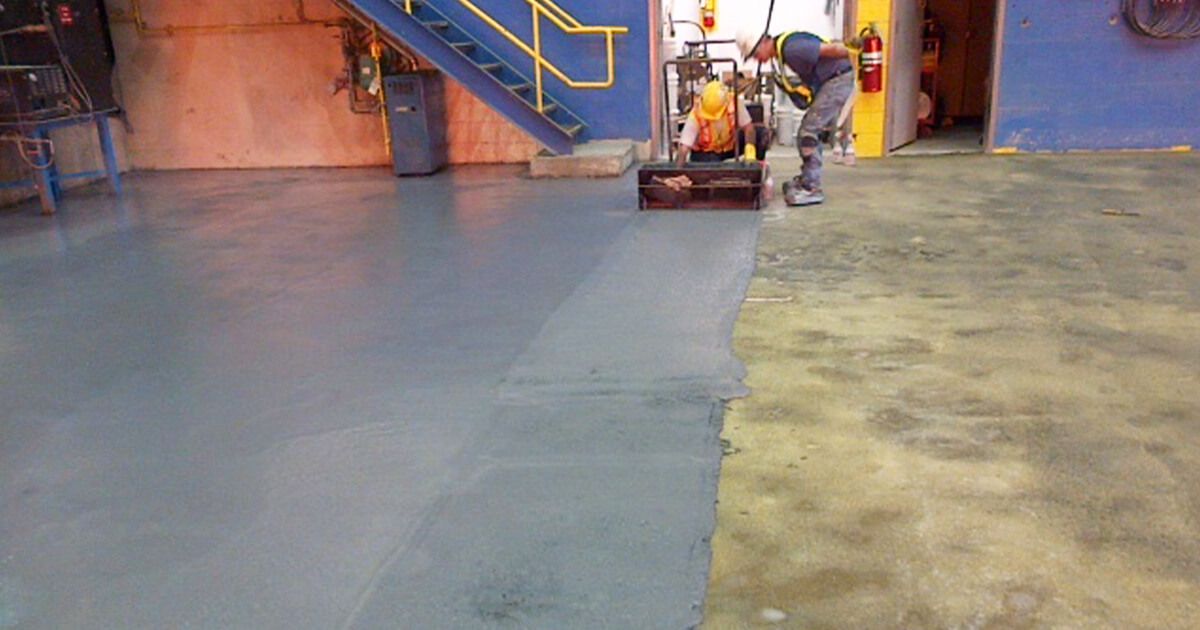
The epoxy we used to resurface this floor was Iron Guard, a steel-reinforced epoxy system with superior chemical resistance. Our process was as follows:
We began with a thorough cleaning process to remove all contaminants from the concrete surface. This step ensures the best possible adhesion of the epoxy.
Next, we applied a prime coat of epoxy and broadcast sand across it. This creates a strong bond between the epoxy and the existing concrete floor.
For the application of Iron Guard, we used screed boxes to maintain a consistent thickness across the entire floor, with the epoxy applied at an average thickness of ¾ inch.
After laying down Iron Guard, we used walk-behind trowels to finish the epoxy surface, much like how you would finish a concrete floor. This ensures a smooth and even surface.
Finally, we performed back-rolling to bring the epoxy resin to the surface. We also broadcast more sand to create a slip-resistant texture that improved the safety and functionality of the floor.
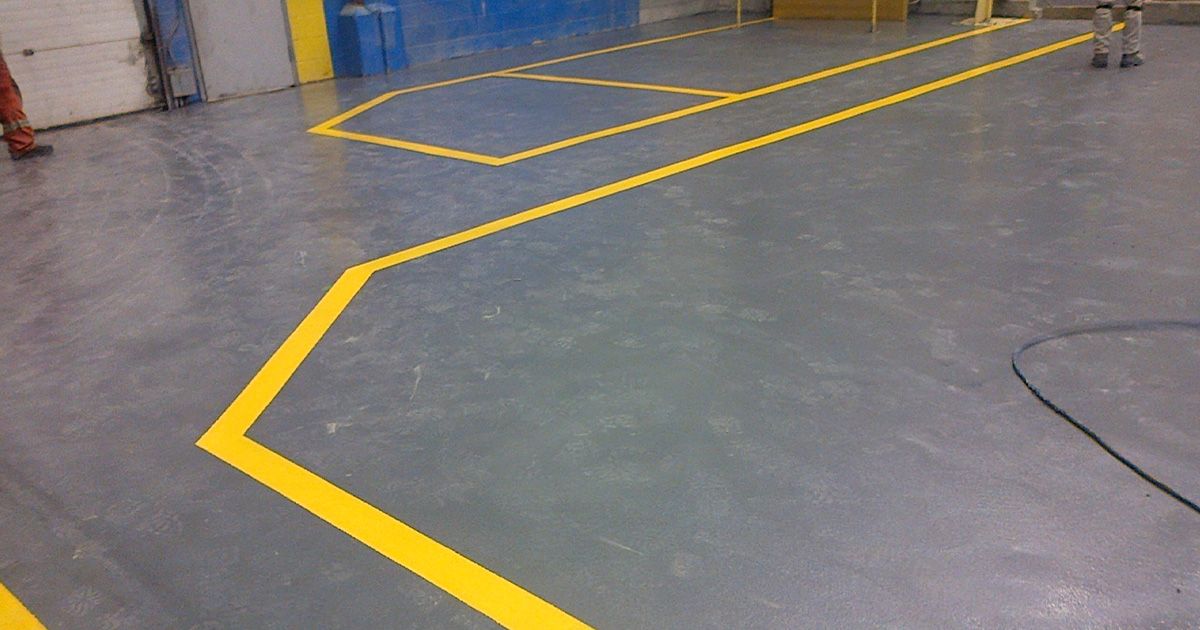
For our client, the project cost was not their biggest motivation for choosing BNE Concrete Floors & Coatings.
It was TIME.
When our client first began looking at options for their floor, they automatically assumed they would need to remove and replace all the concrete and rebar. This would have meant one week for removal, two days for grading, three days for pouring a new floor, and finally, time for curing. The best-case scenario would have been a turnaround of three weeks, during which time the maintenance building would be out of commission, which was unacceptable.
This is why a thick epoxy system was the clear choice. Using epoxy allowed for a faster turnaround with no downtime, improving the long-term durability of the floor and providing a safe, slip-resistant surface.
We completed this concrete resurfacing project in just 12 days without a single day of downtime. Using Iron Guard's steel-reinforced epoxy system, our approach not only met but exceeded our client's expectations. This project brings home the importance of choosing the right partner for your flooring needs - one that understands the value of time.
As we continue this series, we look forward to sharing more insights and successes, demonstrating why BNE remains at the forefront of concrete flooring and coating solutions.
At BNE, we are trusted experts in concrete finishing. We have the knowledge, equipment, and skills to properly install concrete for any type of project. We use industry-leading technology and expertise to provide the client with a concrete structure that will last. Our clients seek us out because we are a single source providing concrete finishing, polish and epoxy. This saves them time, money, and the hassle of communicating their needs to various contractors. Do not hesitate to reach out to us for your next construction project. We are just one phone call or email away!
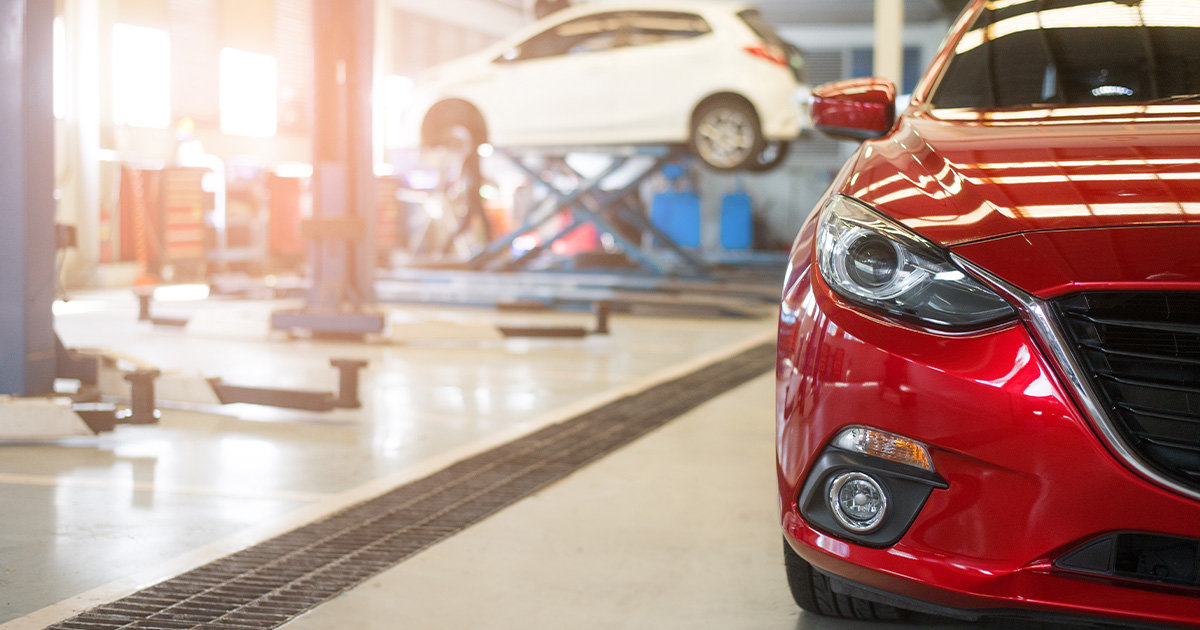
Picture this: a busy automotive shop filled with skilled mechanics working diligently on cars, with tools clanging and engines roaring. Now, beneath all this organized chaos lies a critical but often unnoticed element that plays a pivotal role in the success of any automotive workshop – the flooring.
In the past decade, auto dealerships have transitioned from dingy, uninviting service areas to well-lit, aesthetically pleasing spaces for both customers and mechanics. With the increasing demand for skilled mechanics, it's essential to provide them with a bright, clean, and safe working environment. This shift has led to the adoption of light-reflective epoxy and resinous flooring, prioritizing the well-being and efficiency of the mechanics.
The choice of flooring material in automotive workshops is a decision that can impact productivity, safety, and the overall efficiency of your operations. Whether you run a bustling repair shop, a custom auto body garage, or a tire service centre, the type of flooring you choose can make a world of difference in how smoothly your day-to-day operations run.
In this blog post, we're going to learn why epoxy floorings are the ideal solution for automotive shops. From durability to safety and everything in between, we'll explore why having the right flooring in your workshop is not just a matter of aesthetics but a fundamental necessity.
At BNE, we are trusted experts in concrete finishing. We have the knowledge, equipment, and skills to properly install concrete for any type of project. We use industry-leading technology and expertise to provide the client with a concrete structure that will last. Our clients seek us out because we are a single source providing concrete finishing, polish and epoxy. This saves them time, money, and the hassle of communicating their needs to various contractors. Do not hesitate to reach out to us for your next construction project. We are just one phone call or email away!
An automotive shop’s flooring is a foundational element of its operation. It must endure the weight of heavy vehicles, withstand chemical spills, and provide a secure and comfortable workspace for mechanics.
The right flooring choice can streamline workflow, diminish maintenance expenses, and elevate safety standards, making it an essential consideration for any automotive shop owner.
However, automotive shops face distinct challenges, including rapid wear and tear, leading to structural issues and safety concerns. These problems are exacerbated by frequent occurrences of chemical spills, oil leaks, and grease buildup.
This results in the need for ongoing maintenance that can be both time-consuming and costly, diverting resources from core automotive services.
Epoxy floorings are the optimal solution to these challenges. Engineered to bear the substantial loads of vehicles, resist chemical damage, and offer a durable, smooth surface, epoxy flooring is tailored to meet the daily demands of an automotive shop.
Its seamless design minimizes tripping hazards and simplifies cleaning, ensuring a safer and more efficient working environment. By selecting epoxy floorings, shop owners can notably reduce flooring wear and tear, enhance safety, and realize long-term savings on maintenance expenses.
Epoxy floorings are renowned for their exceptional durability. They can withstand heavy loads, including the weight of vehicles and equipment, without cracking or breaking. Concrete floorings have a long lifespan, making them a cost-effective investment for automotive shops.
Epoxy floorings are highly resistant to the wear and tear caused by heavy automotive equipment, such as vehicle lifts and jacks. They are also resistant to the chemicals commonly used in automotive maintenance, such as oils, lubricants, and solvents.
Concrete floorings are relatively easy to maintain, requiring minimal upkeep. Regular cleaning with mild detergents and water is usually sufficient to keep them in good condition. The smooth, seamless surface of epoxy floorings makes sweeping debris and spills easy.
Concrete floorings can be customized to include anti-slip additives or coatings, enhancing safety in the automotive shop. The absence of seams or grout lines reduces tripping hazards and creates a safer working environment for mechanics. They are fire-resistant and don't emit harmful fumes, contributing to overall shop safety.
While the initial installation cost of epoxy floorings may be higher than some alternatives, they offer substantial long-term cost savings. Their durability means fewer repairs and replacements, reducing maintenance expenses over time. The resistance to chemicals and stains also minimizes the need for costly flooring treatments or coatings.
Each type of epoxy flooring has unique characteristics and advantages, allowing automotive shop owners to choose the one that best suits their needs and preferences.
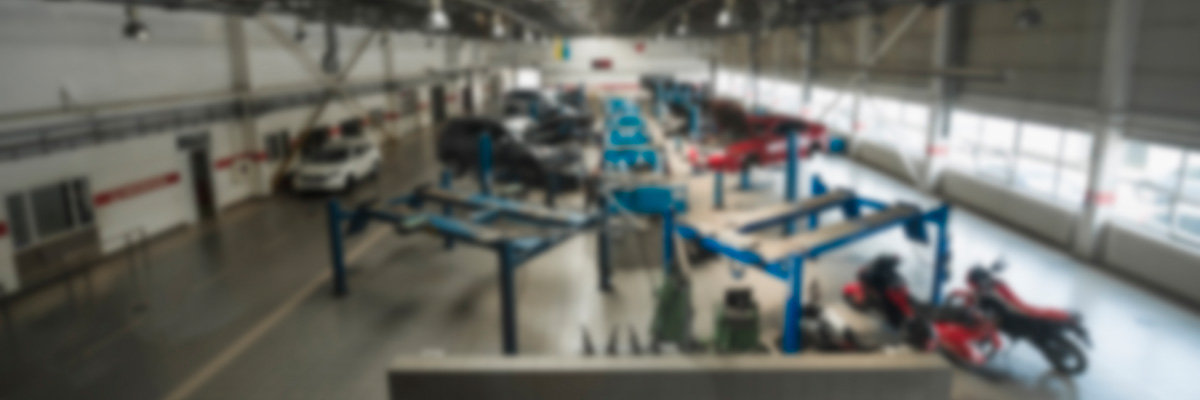
Let’s explore a few.
Traditional Concrete: Traditional concrete floorings are a straightforward and cost-effective choice. They are poured on-site, smoothed, and finished to create a solid, durable surface. While simple, they offer excellent strength and durability, making them suitable for many automotive shops. If you’re using traditional concrete, the use of a densifier and/or concrete sealer is important.
Epoxy Coatings: Epoxy coatings are applied over existing concrete floorings. They consist of epoxy resin and a hardener that creates a seamless, glossy surface. Epoxy coatings are known for their chemical resistance, making them suitable for automotive shops where spills are common. They can be customized with various colours and textures.
UV Epoxy Coatings: UV epoxy coatings in automotive shops provide protection to the floorings and surfaces from the harsh conditions commonly encountered in these environments. These coatings not only offer excellent resistance to UV radiation but also enhance the overall durability, chemical resistance, and aesthetic appeal of the flooring.
Polished Concrete: Polished concrete involves grinding the surface of the concrete to create a smooth, glossy finish. This process not only enhances aesthetics but also improves the flooring's durability. Polished concrete is easy to clean and maintain, making it a popular choice for automotive shops. If you’re using polished concrete, the use of a densifier and/or concrete sealer is important.
Before selecting an epoxy flooring, carefully assess your shop's requirements and priorities. Consider the types of vehicles serviced, the equipment used, and the areas where the flooring will be installed.
Purpose: Determine the primary purpose of the area where the flooring will be installed. For example, service bays may have different requirements than customer waiting areas.
Durability: Consider the expected wear and tear, including heavy equipment and vehicle traffic.
Chemical Resistance: If your shop deals with oil, grease, or chemicals, prioritize flooring options that offer chemical resistance.
Aesthetics: Think about the appearance you want for your shop, as different flooring types offer various design options.
Safety: Assess the importance of safety features, such as slip and fire resistance.
Budget: Determine your budget for both the initial installation and long-term maintenance, as some options may have higher upfront costs but lower maintenance costs.
Regardless of the type of epoxy flooring you choose, professional installation is crucial.
Skilled installers have the expertise to prepare the substrate, apply the flooring correctly, and ensure it meets safety standards. Professional installation minimizes the risk of issues like cracks, uneven surfaces, or adhesion problems. It also helps ensure that the chosen flooring type performs as intended and has a longer lifespan.
At BNE, we are trusted experts in concrete finishing. We have the knowledge, equipment, and skills to properly install concrete for any type of project. We use industry-leading technology and expertise to provide the client with a concrete structure that will last. Our clients seek us out because we are a single source providing concrete finishing, polish and epoxy. This saves them time, money and the hassle of communicating their needs to various contractors. Do not hesitate to reach out to us for your next construction project. We are just one phone call or email away!

According to the Centers for Disease Control and Prevention (CDC), on any given day in the United States, about one in 31 hospital patients contracts a healthcare-associated infection (HAI). In Canada, the statistic is 1 in 9 patients, according to the Provincial Infection Control Network of British Columbia (PICNet). HAIs are infections that patients get while receiving treatment for separate medical or surgical conditions that initially brought them in.
These numbers are alarming.
Ensuring the utmost cleanliness and hygiene standards within hospitals and healthcare establishments is an absolute imperative. The health and safety of patients, staff, and visitors are dependent on an environment free of contaminants and pathogens.
Beyond aesthetics, clean floors play a pivotal role in eliminating cross-contamination, safeguarding immunocompromised patients, and ensuring the safety of the healthcare ecosystem. Epoxy coatings, characterized by their seamless and impermeable nature, create an unwelcoming environment for germ spread.
Their resistance to chemicals enables the utilization of disinfectants without compromising the floor's structural integrity. Epoxy-coated floors provide remarkable durability, withstanding constant foot traffic, heavy machinery, and rigorous cleaning protocols existing in the healthcare industry.
In today’s blog post, we will share more information about epoxy floor coatings, maintenance and cleaning tips and lastly, factors to consider while implementing them.
At BNE, we are trusted experts in epoxy flooring. We have the knowledge, equipment, and skills to properly install concrete for any type of project. We use industry-leading technology and expertise to provide the client with a concrete structure that will last. Our clients seek us out because we are a single source in providing concrete finishing, polish and epoxy floor systems. This saves them time, money and the hassle of communicating their needs to various contractors. Do not hesitate to reach out to us for your next hospital or healthcare construction project. We are just one phone call or email away!
Before further exploring the relationship between epoxy floor coatings and healthcare facilities, let's take a moment to understand what epoxy floor coatings actually are.
Epoxy coatings are a type of high-performance surface finish that is created by mixing epoxy resin with a hardening agent. The resulting chemical reaction produces a tough, durable, and seamless layer that adheres tightly to the underlying concrete substrate. Epoxy coatings are known for their exceptional strength, resistance to chemicals and abrasion, and ability to provide a smooth, non-porous surface.
Epoxy floor coatings offer a range of distinct advantages that make them particularly well-suited for healthcare environments, where cleanliness and hygiene are all-time high concerns.
Epoxy-coated floors have gained immense popularity in healthcare environments not only for their durability and hygiene benefits but also for their remarkably easy maintenance and cleaning.

Here’s how:
Epoxy-coated floors feature a seamless and non-porous surface, leaving no room for dirt, liquids, or contaminants to penetrate or accumulate. This eliminates the need for labour-intensive scrubbing and extensive cleaning processes, as debris can be easily wiped or swept away.
Spills are a common occurrence in healthcare facilities, ranging from water and liquids to harsh chemicals. Epoxy coatings provide a protective barrier that prevents these substances from seeping into the flooring, allowing for quick cleanup without staining or damaging the floor's integrity.
Cleaning epoxy-coated floors involves simple wiping or mopping with mild cleaning solutions. The non-absorbent nature of epoxy prevents liquids from being absorbed, making cleanup swift and efficient.
Epoxy-coated floors are compatible with a wide range of disinfectants and cleaning agents commonly used in healthcare settings. The impermeable nature of the coating ensures that disinfectants effectively eliminate pathogens on the surface, contributing to infection control protocols.
Traditional flooring materials often require extended drying periods after cleaning, causing disruptions in healthcare operations. Epoxy-coated floors, on the other hand, have rapid drying times due to their non-absorbent nature.
Unlike some other flooring options that have joints or grout lines where dirt and microbes can accumulate, epoxy-coated floors provide a seamless and smooth surface.
Epoxy coatings are highly stain-resistant, meaning that even stubborn substances like ink, blood, or chemicals can be wiped away without leaving permanent marks.
Epoxy floor coatings align seamlessly with Canadian healthcare regulations, addressing infection control through their impermeable nature, which prevents the accumulation of pathogens and cross-contamination. They satisfy cleanability and sanitation standards with their smooth, non-absorbent surfaces, facilitating efficient cleaning and compliance with hygiene requirements.
Epoxy coatings' chemical resistance adheres to regulations that specify approved disinfectants, enabling effective sanitization without compromising floor integrity. The approval of the Canadian Standards Association (CSA) and adherence to Health Canada guidelines assure healthcare facilities of their adherence to recognized safety standards. Epoxy coatings also contribute to environmental sustainability, as low VOC options support Leadership in Energy and Environmental Design (LEED) certification aspirations for healthcare facilities prioritizing indoor air quality.
Choosing and implementing epoxy floor coatings in healthcare facilities requires careful consideration of various factors to ensure the effectiveness, longevity, and suitability of the flooring solution.
Here are a few to keep in mind:
We hope that by reading this blog post, you better understand how epoxy floor coatings promote hygiene and infection control in healthcare settings through their seamless, impermeable design that prevents contamination risks. These coatings stop moisture accumulation, mold growth, and bacterial proliferation, ensuring compliance with strict healthcare standards for patient safety and a sterile environment.

At BNE, we are trusted experts in concrete finishing. We have the knowledge, equipment, and skills to properly install concrete for any type of project. We use industry-leading technology and expertise to provide the client with a concrete structure that will last. Our clients seek us out because we are a single source in providing concrete finishing, polish and epoxy. This saves them time, money and the hassle of communicating their needs to various contractors. Do not hesitate to reach out to us for your next hospital or healthcare construction project. We are just one phone call or email away!
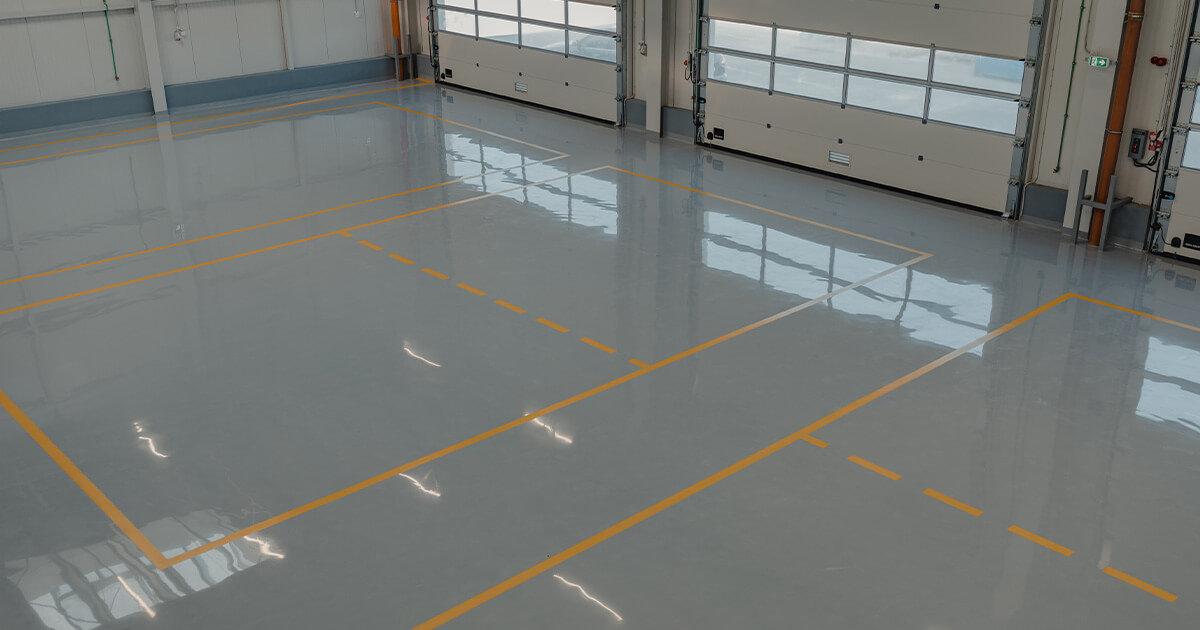
Warehouse environments are the bustling hubs where businesses store, process, and distribute their products. Amid the constant movement of goods, heavy equipment, and foot traffic, the need for a resilient and reliable flooring solution becomes paramount. This is where epoxy floor coatings step in as a game-changing solution.
Epoxy floor coatings are designed to provide exceptional durability, even under the most challenging conditions. They are engineered to resist abrasion, chemicals, and impacts, ensuring that your warehouse floor maintains its integrity over time. Beyond durability, these coatings enhance functionality with their customizable features, such as slip-resistant textures and designated traffic zones.
In this blog post, we'll further explore epoxy floor coatings and share why they have become the go-to choice for warehouses seeking both durability and functionality in their flooring.
At BNE, we are trusted experts in concrete finishing. We have the knowledge, equipment, and skills to properly install concrete for any type of project. Our clients seek us out because we are a single source in providing concrete finishing, polish and epoxy. This saves them time, money and the hassle of communicating their needs to various contractors. Do not hesitate to reach out to us for your next construction project. We are just one phone call or email away!
Epoxy floor coatings offer many advantages to warehouses that extend beyond their initial application.
Here's how epoxy coatings can transform the warehouse environment:
Durability and Longevity: Epoxy floor coatings are engineered to withstand the heavy demands of warehouse activities. The strong chemical bond they form with the concrete surface creates a resilient barrier that can endure the weight of forklifts, pallets, and heavy equipment without showing signs of wear or deterioration.
Resistance to Chemicals, Stains, and Impact: Warehouses often handle a range of substances, from oils and lubricants to harsh chemicals. Epoxy coatings act as a protective shield, offering remarkable resistance to chemicals that might otherwise erode traditional flooring materials.
Easy Maintenance and Cleaning: Maintaining a clean and organized warehouse is essential for operational efficiency. Epoxy-coated floors simplify this task by providing a smooth, seamless surface that is easy to clean. Spills and debris can be swiftly wiped away, reducing the likelihood of accidents and the time spent on maintenance.
Enhanced Safety with Slip-Resistant Coatings: Safety is paramount in warehouse environments, where the risk of slips and falls is a constant concern. Epoxy floor coatings can be customized with anti-slip additives that improve traction, even in wet conditions.
Aesthetic Improvements and Customization Options: Warehouses no longer need to sacrifice aesthetics for functionality. Epoxy coatings come in a variety of colours, finishes, and patterns, allowing you to customize the appearance of your warehouse floor to align with your brand or specific requirements. Whether you prefer a high-gloss finish or a more subtle matte look, epoxy coatings offer aesthetic versatility.
Epoxy coatings offer a range of specialized formulations to cater to diverse warehouse requirements.
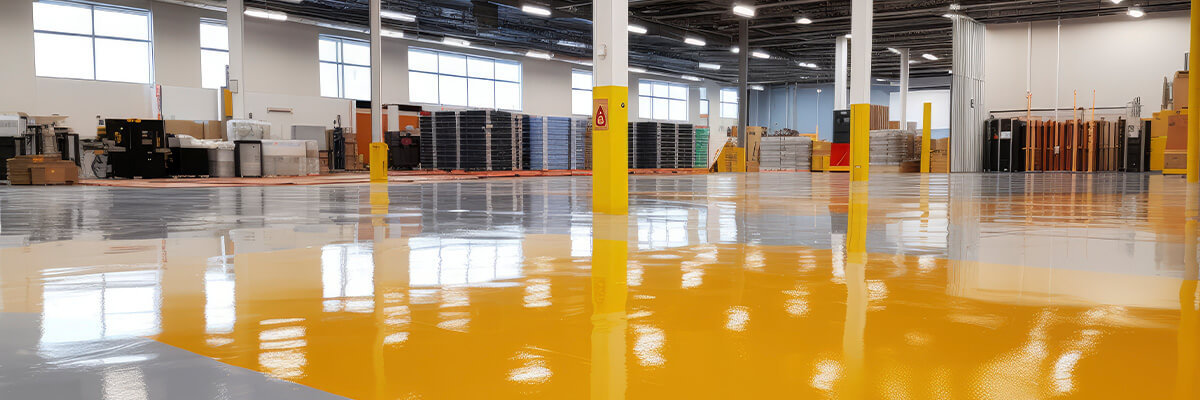
Here are a few:
Self-Leveling Epoxy Coatings: These coatings are designed to create a perfectly smooth and level surface, making them ideal for warehouses where a seamless, even floor is essential. They can cover minor imperfections in the substrate, resulting in a visually appealing and functional floor that's easy to clean and navigate.
Epoxy Mortar Coatings for Heavy-Duty Areas: In sections of the warehouse subjected to extreme impacts, such as loading docks or areas with heavy machinery, epoxy mortar coatings excel. Formulated with aggregates like quartz or silica, these coatings provide exceptional durability and impact resistance, effectively withstanding the stress of heavy equipment and frequent movement.
Anti-Static Epoxy Coatings for Electronics Storage: Warehouses dealing with sensitive electronic components or equipment must mitigate the risk of static electricity, which can damage these items. Anti-static epoxy coatings contain conductive materials that help dissipate static charges, ensuring a controlled electrostatic discharge environment and safeguarding valuable electronics.
UV-Resistant Epoxy Coatings for Outdoor Warehouses: For warehouses with outdoor sections or those exposed to natural sunlight, UV-resistant epoxy coatings are vital. These coatings are formulated to withstand the fading and degradation caused by prolonged sun exposure, ensuring that the floor maintains its appearance and performance over time.
High-Build Epoxy Coatings for Enhanced Thickness: In areas where added durability and thickness are desired, high-build epoxy coatings excel. These coatings can be layered to achieve a greater thickness, providing increased resistance to impacts, abrasion, and heavy loads. They're especially useful in sections of warehouses where extra protection is needed.
Before applying epoxy floor coatings to your warehouse, several crucial factors deserve careful consideration. These considerations will not only influence the success of the application but also determine the longevity and performance of the epoxy-coated floor.
Here's a breakdown of what to keep in mind:
Surface Preparation and Repair: The quality of the substrate plays a significant role in the effectiveness of epoxy coatings. Before application, the concrete surface must be prepped thoroughly by grinding, shot blasting or scarifying and potentially degreased. This includes addressing cracks, divots, and other imperfections. A properly prepared surface ensures proper adhesion and prevents future issues.
Moisture and Temperature Conditions: Epoxy coatings are sensitive to environmental conditions during application. Moisture content in the concrete should be assessed, as excessive moisture can hinder adhesion and lead to delamination. Temperature also matters — epoxy application should ideally occur within a specific temperature range for optimal curing and bonding.
Traffic and Usage Patterns: Understanding the intensity and types of traffic your warehouse experiences is essential. High-traffic areas might require more robust epoxy solutions, such as epoxy mortar coatings, to withstand heavy loads and impacts.
Specific Chemical and Spill Resistance Requirements: Warehouses dealing with chemicals, oils, or other substances need epoxy coatings with corresponding resistance properties. Different epoxy formulations offer varying levels of chemical resistance. Assess the types of chemicals present and choose an epoxy coating that can handle potential spills without deteriorating.
Installing epoxy floor coatings in warehouses involves a systematic process that ensures proper adhesion, durability, and the desired visual appeal.
Let's explore the step-by-step journey of transforming your warehouse floor with epoxy coatings:
Clean and Prepare the Surface: Before any coating is applied, the concrete surface must be mechanically prep by grinding, shot blasting and / or scarifying meticulously to remove dust, dirt, existing coatings and contaminants. Any cracks, divots, or imperfections should be repaired.
Apply Primer: Applying a primer is crucial to create a strong bond between the epoxy coating and the concrete substrate. The primer acts as a bridge, enhancing adhesion and preventing any potential issues. It's essential to choose a primer that complements the specific epoxy system you're using. The use of a moisture tolerant primer is used when elevated moisture levels exist and time is of the essence.
Apply Epoxy Base Coat: The base coat is where the magic begins. This layer consists of the epoxy resin mixed with a hardener. It's spread evenly across the surface, creating a foundation that's not only functional but also visually appealing. The base coat provides the foundation for subsequent layers.
Apply Topcoat for Sealing and Protection: The final step involves applying a topcoat, also known as the seal coat. This layer provides protection against abrasion, chemicals, and UV exposure. The topcoat adds depth to the floor's appearance, enhances the gloss, and ensures the longevity of the epoxy coating system.
Throughout the installation process, precision and attention to detail are paramount. Proper mixing of the epoxy components, uniform application, and adhering to recommended curing times are critical for achieving the desired results. Each step builds upon the previous one, culminating in a floor that seamlessly combines durability, functionality, and aesthetics.
While epoxy-coated warehouse floors are renowned for their durability and resilience, proper maintenance is key to ensuring their longevity and continued performance.
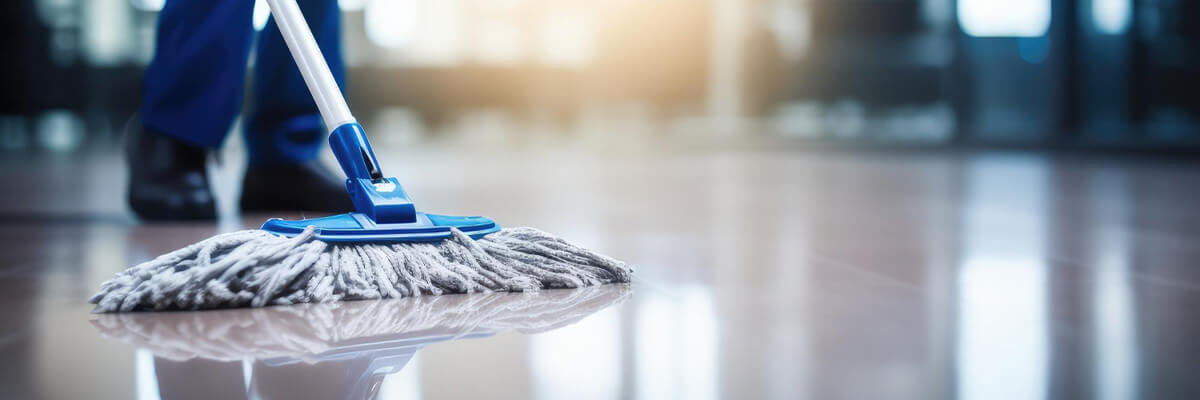
Here's a guide to maintaining your epoxy-coated warehouse floor:
Perform Regular Cleaning Routines: Establishing a consistent cleaning schedule is essential to prevent the buildup of dirt, debris, and contaminants. Regular sweeping or dust mopping removes loose particles that can scratch the epoxy surface. Use a soft-bristle broom or dust mop to avoid damaging the floor.
Use the Right Cleaning Agents: When it's time for more thorough cleaning, choose cleaning agents that are compatible with epoxy coatings. Mild, pH-neutral cleaners are generally recommended. Harsh chemicals or abrasive cleaners can erode the epoxy's protective layer and compromise its appearance.
Address Any Damages Promptly: Accidents happen, and while epoxy coatings are durable, impacts can lead to scratches, chips, or dings. Address any damages promptly to prevent moisture from seeping into the substrate and compromising the adhesion. Minor damages can often be repaired using epoxy filler kits.
Reseal From Time to Time to Extend the Coating's Life: Over time, the topcoat of your epoxy floor may experience wear due to foot and equipment traffic. Periodic resealing helps maintain the floor's protective layer, enhancing its resistance to abrasion and chemical exposure. Consult the manufacturer's guidelines for recommended resealing intervals.
Avoid Harsh Cleaning Equipment: While epoxy coatings are robust, it's advisable to avoid using abrasive scrub brushes or aggressive cleaning machinery. These can scratch or wear away the epoxy's surface, diminishing its gloss and protective qualities.
Prevent Standing Water: While epoxy coatings are water-resistant, allowing standing water to pool on the surface for extended periods can potentially lead to delamination or other issues. Promptly remove any spills or standing water to maintain the floor's integrity.
Apply Mats and Protective Coverings: In high-traffic areas or under heavy equipment, consider using mats or protective coverings. These help distribute weight and reduce wear and tear on specific sections of the floor.
Epoxy floor coatings offer warehouses a durable and functional solution that withstands heavy traffic, chemicals, and impacts.
The installation process involves meticulous surface preparation, primer application, epoxy coat layering, and optional decorative elements, all contributing to a visually appealing and resilient floor.
Maintenance, from regular cleaning to prompt damage addressing and periodic resealing, ensures the floor's longevity and optimal performance. Whether your warehouse requires customization, heavy-duty protection, or an anti-static solution, epoxy coatings enhance both aesthetics and practicality, providing a lasting foundation that meets the demands of your unique space.
At BNE, we are trusted experts in concrete finishing. We have the knowledge, equipment, and skills to properly install concrete for any type of project. Our clients seek us out because we are a single source in providing concrete finishing, polish and epoxy. This saves them time, money and the hassle of communicating their needs to various contractors. Do not hesitate to reach out to us for your next construction project. We are just one phone call or email away!

